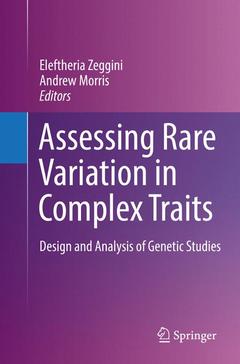Description
Assessing Rare Variation in Complex Traits, Softcover reprint of the original 1st ed. 2015
Design and Analysis of Genetic Studies
Coordinators: Zeggini Eleftheria, Morris Andrew
Language: English
Subject for Assessing Rare Variation in Complex Traits:
Keywords
complex traits; genetics; genotype; polygenic traits; rare variation
Support: Print on demand
263 p. · 15.5x23.5 cm · Hardback
Description
/li>Contents
/li>Comment
/li>
This book is unique in covering a wide range of design and analysis issues in genetic studies of rare variants, taking advantage of collaboration of the editors with many experts in the field through large-scale international consortia including the UK10K Project, GO-T2D and T2D-GENES. Chapters provide details of state-of-the-art methodology for rare variant detection and calling, imputation and analysis in samples of unrelated individuals and families. The book also covers analytical issues associated with the study of rare variants, such as the impact of fine-scale population structure, and with combining information on rare variants across studies in a meta-analysis framework.
Genetic association studies have in the last few years substantially enhanced our understanding of factors underlying traits of high medical importance, such as body mass index, lipid levels, blood pressure and many others. There is growing empirical evidence that low-frequency and rare variants play animportant role in complex human phenotypes. This book covers multiple aspects of study design, analysis and interpretation for complex trait studies focusing on rare sequence variation. In many areas of genomic research, including complex trait association studies, technology is in danger of outstripping our capacity to analyse and interpret the vast amounts of data generated. The field of statistical genetics in the whole-genome sequencing era is still in its infancy, but powerful methods to analyse the aggregation of low-frequency and rare variants are now starting to emerge.The chapter Functional Annotation of Rare Genetic Variants is available open access under a Creative Commons Attribution 4.0 International License via link.springer.com.




